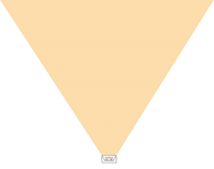liniLED® Side
IP67/IP68/IP69
We will be there to help you!
Asymmetric lighting is an exciting and purposeful choice within project lighting. It offers installers and designers a flexible and efficient solution to illuminate spaces functionally and visually appealing. Let's take a closer look at what it includes and why it is valuable for different applications.
The difference between symmetrical and asymmetrical lighting is essential when designing lighting for commercial projects. We briefly list the differences:
Symmetrical lighting
is generally used for wide areas such as warehouses, hallways or open office spaces.

Asymmetrical lighting
minimizes direct and indirect glare. This is especially beneficial in areas where eyestrain can result from prolonged exposure to bright light.
is ideal for specific areas that need to be highlighted, such as product displays, artwork or architectural details.

Minimizes glare:
Unlike symmetrical lighting, which often causes direct and indirect glare, asymmetrical light minimizes these annoying effects. It is designed to reduce sharp shadows and create a comfortable working environment.
Focused light distribution:
Asymmetric lighting is ideal for highlighting specific areas, such as product displays, artwork or architectural details. Light is directed where it is needed, attracting attention.
Energy efficient and reduced light pollution:
Asymmetric LED lighting can help save energy. Because light is focused, waste is minimized and efficiency is increased.
Aesthetically pleasing:
Asymmetric lighting can contribute to the overall aesthetics of a room. It creates interesting lighting effects and enhances the atmosphere.
Safety enhancing:
The directional light distribution creates an effective flood light, improving the illumination of a sidewalk, for example.
Less hassle:
By choosing a lighting solution specially made to achieve an asymmetrical light image, you don't have to make difficult constructions with profiles.
When choosing the right lighting solution, it is important to properly identify the environment and the purpose of the lighting. What is the lighting for, at what height will it be mounted, is it visible or is it hidden behind a cove?
IP67/IP68/IP69
Are you currently working on a project where and not sure what the best option is? We are happy to help you with targeted advice and reliable products. And all without any obligation.
